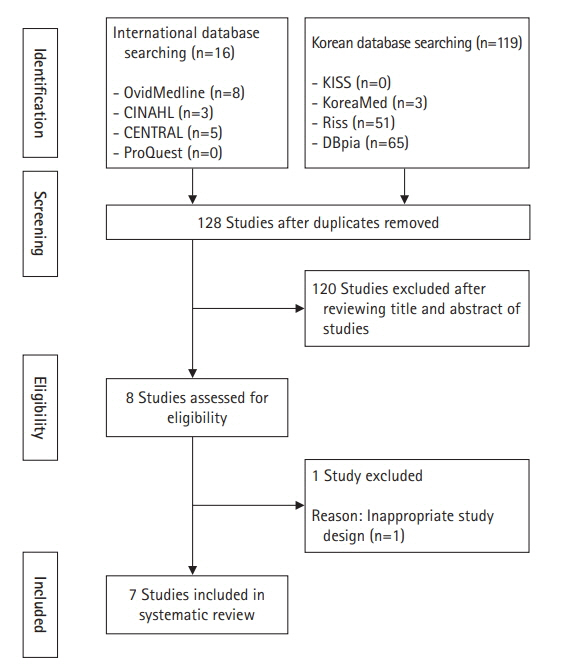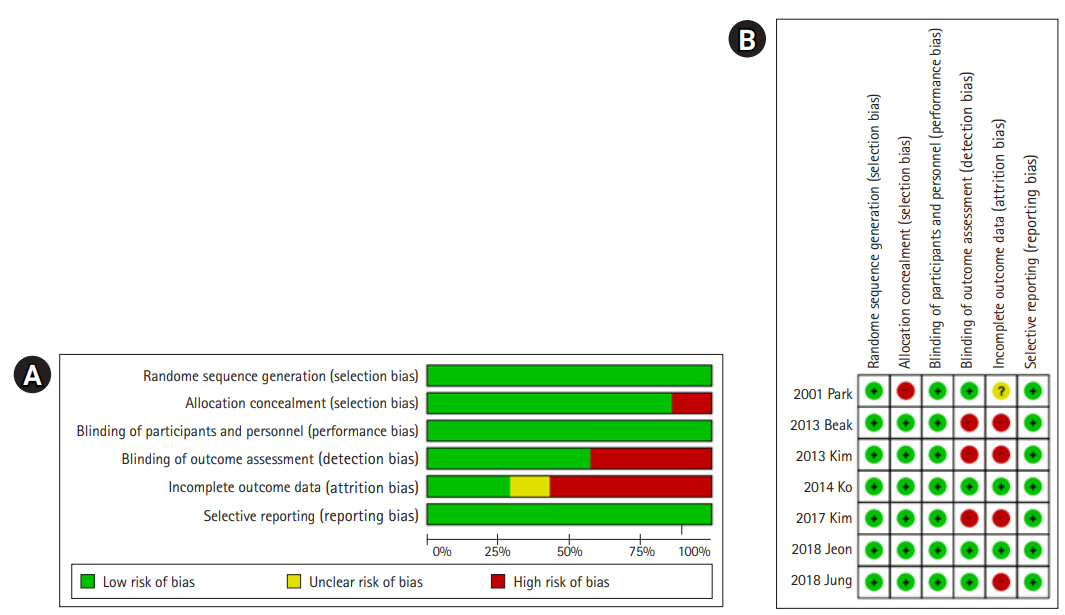Korean J Women Health Nurs.
2020 Dec;26(4):274-284. 10.4069/kjwhn.2020.10.28.
The effects of health care programs for gestational diabetes mellitus in South Korea: a systematic review
- Affiliations
-
- 1Department of Nursing, Donggang University, Gwangju, Korea
- 2Christian College of Nursing, Gwangju, Korea
- KMID: 2510365
- DOI: http://doi.org/10.4069/kjwhn.2020.10.28
Abstract
- The purpose of this study was to investigate the effects and characteristics of health care programs for pregnant women with gestational diabetes mellitus (GDM) in Korea. This study was conducted according to the Cochrane Collaboration’s systematic literature review handbook and the Preferred Reporting Items for Systematic Reviews and Meta-Analyses reporting guideline. We searched eight international and domestic electronic databases for relevant studies. Two reviewers independently selected the studies and extracted data. For each study, information on the research method, participants, characteristics of the program, and results were extracted using a previously established coding table. The National Evidence-based Healthcare Collaborating Agency’s risk of bias assessment tool for non-randomized studies was used to assess the risk of bias of the included articles. A qualitative review of the selected studies was performed because the interventions differed considerably and the measured outcomes varied. Out of 128 initially identified papers, seven were included in the final analysis. The risk of bias was evaluated as generally low. Health care programs for pregnant women with GDM showed positive effects on blood glucose control. Anxiety and depression were reduced, and self-management and self-care behavior, self-efficacy, and maternal identity improved. Our study provides clinical evidence for the effectiveness of health care programs for pregnant women with GDM, and its results can be used to support the development of health care programs for GDM. More well-designed research is needed on GDM, especially studies that deal with emotional stress and apply a family-oriented approach.
Figure
Cited by 2 articles
-
Effects of nursing intervention programs for women with gestational diabetes: a systematic review of randomized controlled trials
JooHee Kim, ChaeWeon Chung
Korean J Women Health Nurs. 2021;27(1):14-26. doi: 10.4069/kjwhn.2021.03.02.Effects of nonpharmacological interventions on the psychological health of high-risk pregnant women: a systematic review and meta-analysis
Hyeji Yoo, Sukhee Ahn
Korean J Women Health Nurs. 2021;27(3):180-195. doi: 10.4069/kjwhn.2021.09.17.
Reference
-
References
1. Goyal A, Gupta Y, Singla R, Kalra S, Tandon N. American Diabetes Association “Standards of Medical Care-2020 for Gestational Diabetes Mellitus”: a critical appraisal. Diabetes Ther. 2020; 11(8):1639–1644. https://doi.org/10.1007/s13300-020-00865-3.
Article2. American Diabetes Association. 2. Classification and diagnosis of diabetes: Standards of Medical Care in Diabetes-2019. Diabetes Care. 2019. 2019; 42(Suppl 1):S13–S28. https://doi.org/10.2337/dc19-S002.3. Korean Diabetes Association. Diabetes fact sheer in Korea 2013 [Internet]. Seoul: Author;2013. [cited 2020 Sep 12]. Available from: https://www.diabetes.or.kr/pro/news/admin.php?code=admin&page=1&mode=view&number=1426.4. Statistics Korea. Birth statistics in 2017 (confirmed) [Internet]. Daejeon: Author;2018. [cited 2020 Sep 12]. Available from: http://www.kostat.go.kr/portal/korea/kor_nw/1/1/index.board?bmode=read&aSeq=369566.5. Korean Statistical Information Service. Multi-frequency injury salary status by disease subclass (total) [Internet]. Daejeon: Author;2019. [cited 2020 Sep 12]. Available from: http://kosis.kr/statHtml/statHtml.do?orgId=350&tblId=DT_35001_A073112&vw_cd=MT_ZTITLE&list_id=350_35001_6&seqNo=&lang_mode=ko&language=kor&obj_var_id=&itm_id=&conn_path=MT_ZTITLE.6. Buchanan TA, Xiang AH. Gestational diabetes mellitus. J Clin Invest. 2005; 115(3):485–491. https://doi.org/10.1172/JCI24531.
Article7. Moses RG. The recurrence rate of gestational diabetes in subsequent pregnancies. Diabetes Care. 1996; 19(12):1348–1350. https://doi.org/10.2337/diacare.19.12.1348.
Article8. Byun YJ, Kim HS. Recent advances in gestational diabetes mellitus. Korean J Obstet Gynecol. 2007; 50(11):1445–1454.9. Kim HS, Kim S. Effects of an integrated self-management program on self-management, glycemic control, and maternal identity in women with gestational diabetes mellitus. J Korean Acad Nurs. 2013; 43(1):69–80. https://doi.org/10.4040/jkan.2013.43.1.69.
Article10. Choi ES, Oh JA, Hur MH, Lee IS, Choi SY. The knowledge and learning needs about gestational diabetes in pregnant women. J Korean Acad Women Health Nurs. 2000; 6(1):96–108.11. Parsons J, Sparrow K, Ismail K, Hunt K, Rogers H, Forbes A. A qualitative study exploring women's health behaviours after a pregnancy with gestational diabetes to inform the development of a diabetes prevention strategy. Diabet Med. 2019; 36(2):203–213. https://doi.org/10.1111/dme.13794.
Article12. Choi JM. The family type and correct family attitude of pregnant diabetes women. J Korean Diabetes. 2020; 21(2):98–103. https://doi.org/10.4093/jkd.2020.21.2.98.
Article13. Higgins JP, Green S. Cochrane handbook for systematic reviews of interventions, version 5.0. 1 [Internet]. London: The Cochrane Collaboration;2008. [cited 2020 Nov 1]. Available from: https://handbook-5-1.cochrane.org/.14. Moher D, Liberati A, Tetzlaff J, Altman DG; PRISMA Group. Preferred reporting items for systematic reviews and meta-analyses: the PRISMA statement. PLoS Med. 2009; 6(7):e1000097. https://doi.org/10.1371/journal.pmed.1000097.
Article15. Kim SY, Park JE, Seo HJ, Lee YJ, Jang BH, Son HJ, et al. NECA’s guidance for undertaking systematic reviews and meta-analyses for intervention. Seoul: National Evidence-based Healthcare Collaborating Agency;2011.16. Beak ES, Park HJ. Effects of a case management program on self-efficacy, depression and anxiety in pregnant women with gestational diabetes mellitus. Korean J Women Health Nurs. 2013; 19(2):88–98. https://doi.org/10.4069/kjwhn.2013.19.2.88.
Article17. Jeon YK, Kim HJ, Yang MY, Jung DY, Yoon KY, Noh GO. Effects of a postnatal care program on self-efficacy, self-management, and glycemic control in women with gestational diabetes mellitus. Korean J Women Health Nurs. 2018; 24(4):367–378. https://doi.org/10.4069/kjwhn.2018.24.4.367.
Article18. Ko JM, Lee JK. Effects of a coaching program on comprehensive lifestyle modification for women with gestational diabetes mellitus. J Korean Acad Nurs. 2014; 44(6):672–681. http://dx.doi.org/10.4040/jkan.2014.44.6.672.
Article19. Kim YS. Effects of web-based self-management program in women with gestational diabetes mellitus [doctoral thesis]. Seoul: The Catholic University of Korea;2017. 53.20. Jung AR. Analysis of the effect of IT-based exercise education and monitoring for gestational diabetes mellitus patients [doctoral thesis]. Seoul: Kookmin University;2018. 100.21. Park BK. The effects of carbohydrate-restricted diet therapy in gestational diabetes mellitus [master’s thesis]. Seoul: Yonsei University;2001. 47.22. Viera AJ, Garrett JM. Understanding interobserver agreement: the kappa statistic. Fam Med. 2005; 37(5):360–363.23. Horvath K, Koch K, Jeitler K, Matyas E, Bender R, Bastian H, et al. Effects of treatment in women with gestational diabetes mellitus: systematic review and meta-analysis. BMJ. 2010; 340:c1395. https://doi.org/10.1136/bmj.c1395.
Article24. Falavigna M, Schmidt MI, Trujillo J, Alves LF, Wendland ER, Torloni MR, et al. Effectiveness of gestational diabetes treatment: a systematic review with quality of evidence assessment. Diabetes Res Clin Pract. 2012; 98(3):396–405. https://doi.org/10.1016/j.diabres.2012.09.002.
Article25. American Diabetes Association. Diagnosis and classification of diabetes mellitus. Diabetes Care. 2009; 32 Suppl 1(Suppl 1):S62–S67. https://doi.org/10.2337/dc09-S062.26. Kim WJ, Park CY. Review of the potential glycemic markers glycated albumin and 1,5-anhydroglucitol. J Korean Diabetes. 2012; 13(1):1–6. https://doi.org/10.4093/jkd.2012.13.1.1.
Article27. Hernandez TL, Friedman JE, Van Pelt RE, Barbour LA. Patterns of glycemia in normal pregnancy: should the current therapeutic targets be challenged? Diabetes Care. 2011; 34(7):1660–1668. https://doi.org/10.2337/dc11-0241.
Article28. Oh TJ, Jang HC. Gestational diabetes mellitus: diagnosis and glycemic control. J Korean Diabetes. 2020; 21(2):69–74. https://doi.org/10.4093/jkd.2020.21.2.69.
Article29. Kim SH. Diagnosis and medical management of gestational diabetes. J Korean Diabetes. 2015; 16(3):174–181. https://doi.org/10.4093/jkd.2015.16.3.174.
Article30. Razee H, van der Ploeg HP, Blignault I, Smith BJ, Bauman AE, McLean M, et al. Beliefs, barriers, social support, and environmental influences related to diabetes risk behaviours among women with a history of gestational diabetes. Health Promot J Austr. 2010; 21(2):130–137. https://doi.org/10.1071/he10130.
Article
- Full Text Links
- Actions
-
Cited
- CITED
-
- Close
- Share
- Similar articles
-
- Nutrition Care in Gestational Diabetes Mellitus
- Epidemiologic Characteristics of Diabetes Mellitus in Korea: Current Status of Diabetic Patients Using Korean Health Insurance Database
- Role of Diabetes Educators and Effectiveness of Diabetes Education
- Dental Health Care for Patients with Diabetes
- The Link Between Sleep and Diabetes Mellitus: A Literature Review



